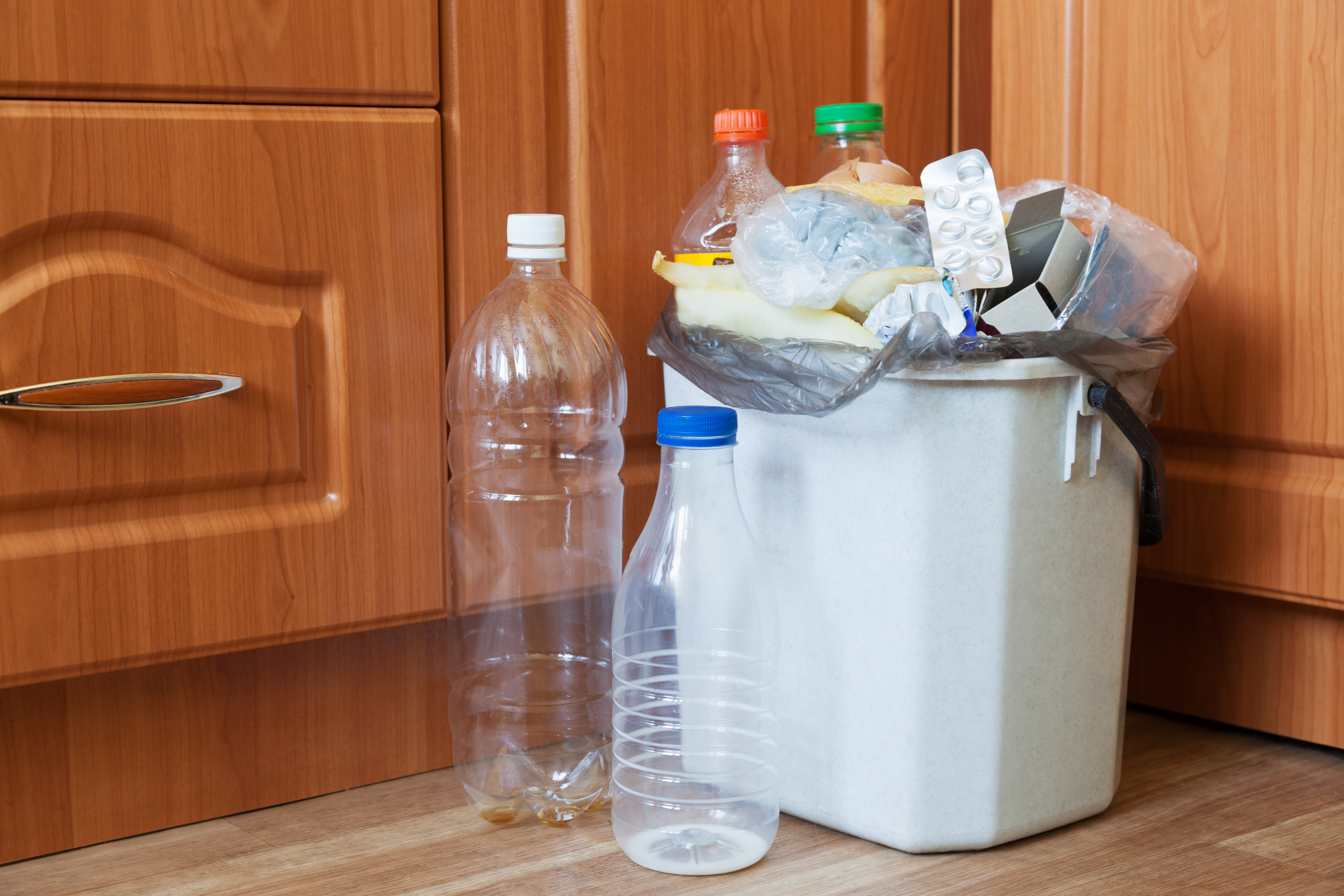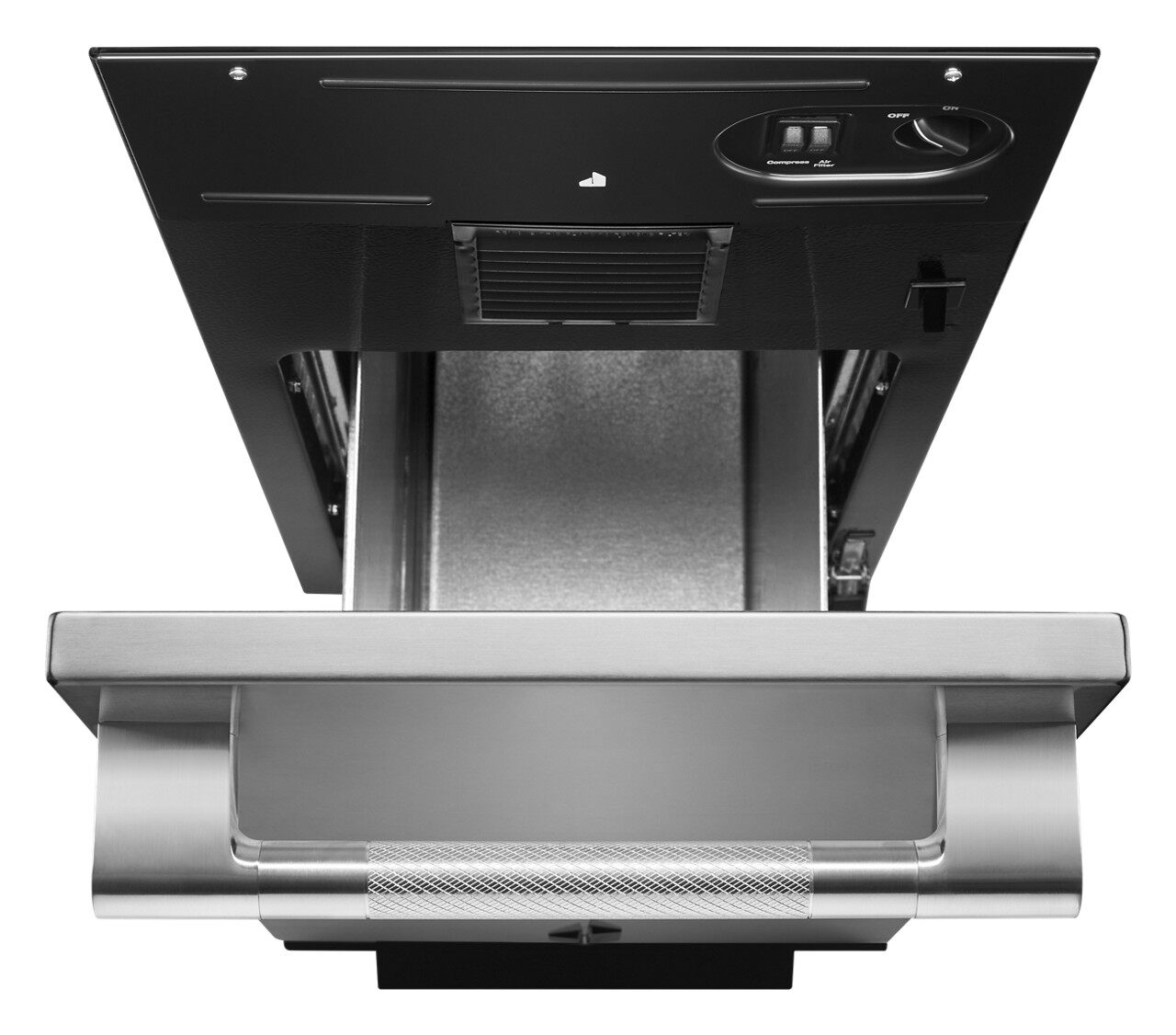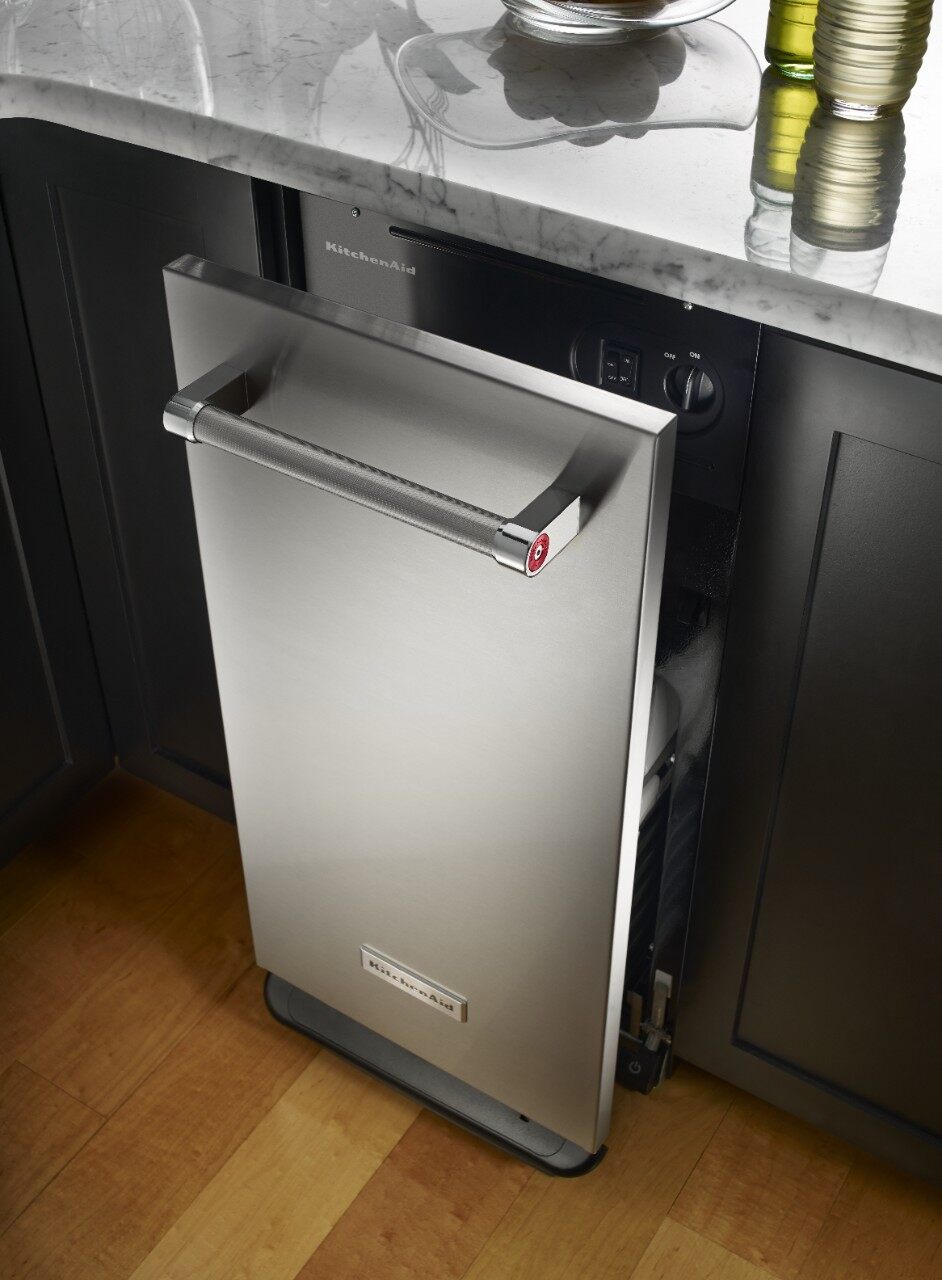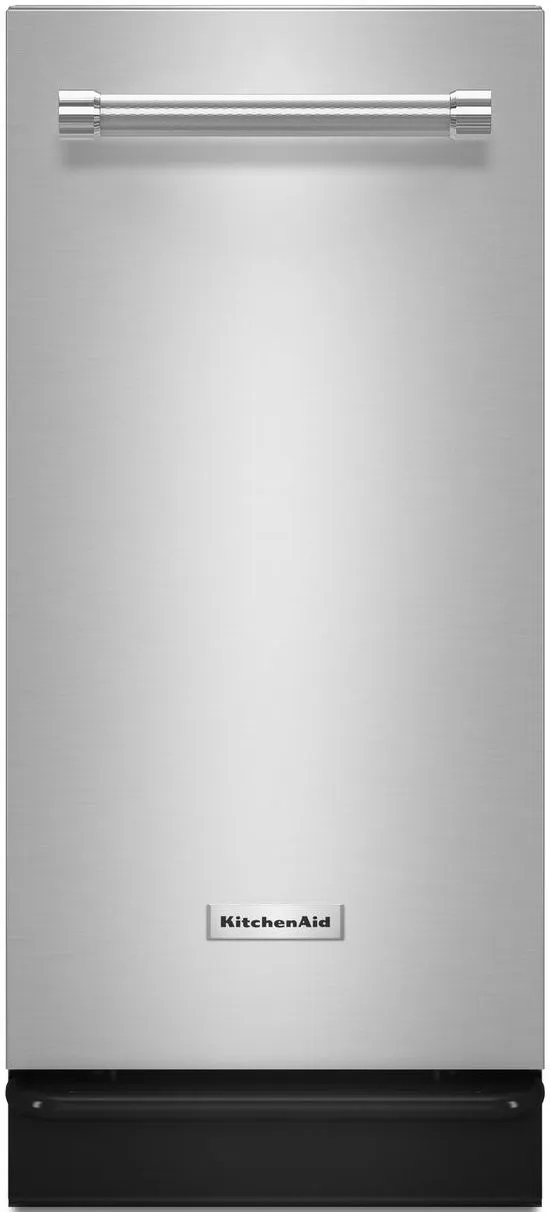
At a Glance:
5 Benefits of Using a Trash Compactor
Once recognized as one of the greenest cities in the nation, Seattle is on its way to reclaiming its spot as an eco-friendly metropolitan. Part of the agenda includes new recycling initiatives — which come with penalty fees when broken — giving Seattle homeowners a reason to pay more attention to what goes into their trash cans.
Many homeowners in Puget Sound are now searching for solutions to keep their trash in check. As the topic continues to trend, eco-friendly appliances like trash compactors are beginning to go viral. But before buying one of these appliances, there are a few important things to keep in mind.
Before revealing five reasons why you should replace your regular trash can with a trash compactor, our experts are giving you the inside scoop on everything you need to know when it comes to buying a garbage compactor. Then, we review our top recommendation — a KitchenAid trash compactor — in hopes to encourage you to get ahead of Seattle’s green agenda and do your part in protecting the environment.

What is a Trash Compactor?
As the name implies, trash compactors compress garbage into smaller blocks that take up less space in a waste bin. But more importantly, these crushed units of trash also use up less space in landfills. As Seattle strives to reach its goal to recycle 60 percent of its waste, trash compactors are (slowly but surely) becoming popular in households who want to do their part in reducing Seattle’s carbon footprint.
But today’s “trash mashers” aren’t the same as those from the ‘60s when the appliances first hit the public market. These days, garbage compactors are designed with style in style in mind, are either built-in units or portable, and powered models offer more power than older editions, meaning more waste can fit in a single trash bag.

Translating Trash Compactor Terminology
Let’s break down trash compactor glossary and why they matter.
✱ Compaction Ratio
This refers to how many bags of regular waste can be compacted into a single mound of garbage. For instance, a 6:1 compaction ration means you can dump and compress six single bags of waste down to one trash compactor garbage bag.
✱ Manual vs. Automatic Trash Compactors
You get the picture here: A manual trash compactor is powered by the user, while an electric trash compactor uses an electric outlet to power its hydraulic compression. There are benefits to both:
- A manual compactor is more affordable and can be used anywhere, but it won’t have as big of a compaction ratio as an electric counterpart.
- Automatic trash compactors do all the work, but they cost more, and they need to be plugged in to work, which limits where they can be used.
✱ Freestanding vs. Built-In Trash Compactors
Like refrigerators and ranges, trash compactors are available as freestanding models (which look like a typical garbage can) or built-in units (which resemble more of a compact dishwasher).
Built-in under-counter counter trash compactors generally measure the same as a standard cabinet. That means they don’t take up a massive amount of storage space, and since many models are panel-ready, there’s also the option to go fully integrated for the full out-of-sight-out-of-mind experience.
But for most households, a freestanding trash compactor is the way to go. For starters, they cost less, plus they take up just about the same space as a regular trash can, meaning the swap is as easy as upgrading.
Shop Trash Compactors at Albert Lee Appliance
Trash Compactors5 Benefits of Using a Trash Compactor
For the most part, trash is an avoided topic. But with households producing larger outputs each year, cities like our home in Seattle are bringing awareness to the issue. Here are five reasons to motivate you to make the change to a trash compactor.

1. Reducing Your Home’s Garbage Volume
Going green may raise a red flag for some, but there are two big reasons why reducing landfills is important. The obvious is cutting down on carbon footprint. But decreasing the amount of trash in landfills means lower costs in operation and management, which are partially funded by tax revenues.
Overall, it’s a win-win. You take out the trash less and spend less on garbage bags by reducing the amount of waste your home adds to landfills, along with their byproducts like methane gas.
2. Using Fewer Plastic Bags
To be clear, garbage compactors do come with a slight trade-off: You do have to buy specific bags to use with them. However, since you also end up using less, finding the right bags to use is a bigger consideration over cost.
Inevitably, you'll use fewer bags than you would with a regular trash bin. That equates to tons of plastic being dumped into the environment.
3. Taking Out Trash Less
If you’re impaired or live on a high floor, taking out the trash can be a nuisance. Luckily, trash compactors let you skip the chore by loading up more trash in a single bag. Do keep in mind, that since a typical bag of compacted trash equates to several regular bags, they will get heavy.
4. Handling Recyclables
We’ve all been guilty of throwing away a soda can or water bottle instead of recycling. If you want to introduce recycling into your everyday routine, a trash compactor is a great solution. For many, this is the sole purpose of one of these appliances.
As Seattle pushes stricter garbage sorting laws, using a compactor can help make it easier to keep recyclable items separate from compostable garbage.
Common recyclable products that can be compacted include:
- Cardboard and paper
- Tins (such as tuna tins)
- Cans
- Glass bottles
- Plastic bottles
5. Managing Indoor Garbage Odors
The biggest issue with first-generation trash compactors was dealing with trash odor from older additions to the bin. Manufacturers addressed the problem by including special filters, and some models even come with fans to help filter out bad smells.
Not even the smartest garbage cans on the market today can do that.
✓ Our Recommended Trash Compactor: KitchenAid® 15" Stainless Steel Built In Trash Compactor

Always inspired by professional designs, this KitchenAid trash compactor makes a statement in the kitchen with a sleek, modern look. A 15-inch build offers maximum garbage capacity inside a slide-out bin for easy access when you need it, and tuck neatly into the cabinet when not in use.
Complete with 1/3 horsepower — the most available without upgrading to commercial power — this KitchenAid trash compactor makes easy work of your everyday compost. Best of all, Whisper Quiet Plus technology and odor management allow this machine to operate behind the scenes virtually unnoticed (like all trash should be).
Trash Compactor FAQs
Let’s round this review out with answers to common questions about trash compactors.
What does a trash compactor do?
Trash compactors work like a garbage truck. They condense household trash into small pieces.
Are trash compactors worth it?
While trash compactors are an investment, they can help reduce the amount of trash in landfills, and use less bags, which can also help households save on the house of home essentials. On average, a kitchen garbage compactor produces 75-percent less volume, which means an average household that goes through 100 bags of garbage a year can reduce that output as low as 25 bags.
How long do trash compactors last?
Trash compactors require little maintenance, but when properly cared for, they can last 6–11 years.
How much garbage can a trash compactor hold?
Automatic trash compactors hold more than their manual counterparts. Overall, expect an indoor trash compactor to hold 5–15 gallons of garbage.
What are the typical trash compactor dimensions?
Home waste compactors typically measure between 12 and 15 inches in width, 35 inches tall, and 24 inches deep. To put that into perspective, a dishwasher is 24 inches wide, 24 inches deep, and 35 inches tall.
Which appliance brands make trash compactors?
Nowadays, many major appliance brands also manufacture trash compactors as a part of their family of products. Of the ones on the market, we recommend a KitchenAid trash compactor, Whirlpool trash compactor, or JennAir trash compactor.
Why Trust Us?
Since 1939, Albert Lee Appliance, a three-generation, family-owned business, continues to grow and serve the greater Seattle area with quality you can count on and service you can trust. We are proud to have served this community for so long and wouldn’t be here without our loyal customers. There is a reason why we are Washington’s largest independent appliance dealer, and it’s not a secret. Simply put: We have the experience. We are the original appliance experts for over eight decades (and counting).
Shop Trash Compactors at Albert Lee Appliance
At Albert Lee Appliance, we provide quality name-brand appliances for great prices. Shop more home appliances today online or visit us today at one of our locations in Puget Sound, WA. In the meantime, browse our website to shop Albert Lee appliance sales and check out Albert Lee appliance reviews online to ensure every purchase is an informed one. More available than ever, our experts at Albert Lee Appliance are always happy to help you discover the benefits of a trash compactor, whether you call us or use our online chat feature. Contact us today!
Learn More: Demystifying Energy Efficient Appliances
- Subscribe to Our Email List
- Shop Appliance Deals
- Learn About Our Services
- Learn About Financing Options
